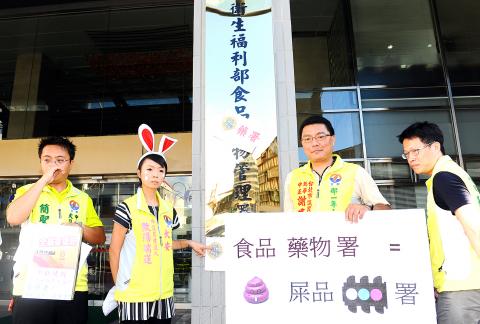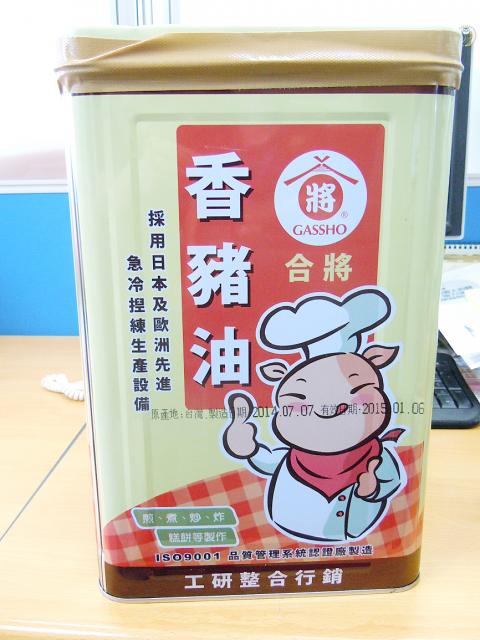The Food and Drug Administration (FDA) yesterday announced progress in its investigation of the allegedly tainted lard oil marketed by Chang Guann Co (強冠企業), stating that GASSHO (工研整合行銷), a trade company based in Taipei City, had bought and sold 69 tonnes of the problematic oil, marketed as “Ho Chiang Fragrant Lard Oil” (合將香豬油), which was divided into 4,611 cartons and sold to at least 473 businesses across the nation.
The FDA said GASSHO’s product is the result of original equipment manufacturing (OEM), whereby the company commissioned Chang Guann Co (強冠企業), a food oil manufacturer in Greater Kaohsiung, to supply the reportedly tainted cooking oil and marketed it in different packaging and that the two products are essentially the same.
The Taipei City Government last night said it was to impose a NT$3 million (US$99,993) penalty on GASSHO on the grounds that the company “attempted to elude inspections and refused to turn in problematic products.”

Photo: Chang Chia-ming, Taipei Times
The city government’s probe revealed that the majority of Ho Chiang Fragrant Lard Oil had been sold to 397 restaurants and eateries in central and southern Taiwan.
It had pulled 425 cartons, and 298 had been disposed of, a city government statement said.
In other developments, the FDA’s Northern Center for Regional Administration director Feng Jun-lan (馮潤蘭) said the FDA completed inspections of the 235 establishments that have purchased oil and made a list of 110 products processed with the tainted oil and marketed by 40 food companies.

Photo: Chang Tsung-chiu, Taipei Times
The list showed 12 products by Wei Chuan Foods Corp (味全食品工業) were processed using the oil, including eight pork floss and four canned meat sauce products, while Chi Mei Frozen Food Co (奇美食品) had 20 products made with the oil, including seven rice dumpling skin products, two sticky rice dumpling products and a baozi containing bamboo shoots, which were sold at 7-Eleven stores.
Out of the total 782 tonnes of problematic lard oil sold, 238.65 tonnes have been pulled; the remaining amount has most likely been consumed by the public or processed into products, she said.
She said that despite being on Chang Guann’s sales record of companies who ordered the “fragrant lard oil,” three companies in Keelung, Hualien County and Yunlin County denied using the allegedly tainted cooking oil and provided a document issued to them by the food oil company, stating that the problematic oil was not the product they had ordered.
Citing findings from the Greater Tainan Department of Health, she said that Haw Di-I Foods Co (好帝一), manufacturer of Bull Head Barbecue Sauce (牛頭牌沙茶醬), did not use the oil, which was refined between March 1 and Aug. 31.
As to why the agency had not yet compiled a list of end products manufactured by the remaining 191 firms which bought the lard oil, she said that these firms are mostly wholesalers, grocery stores, eateries and restaurants that order in smaller quantities and more haphazardly, making the probe more difficult.
The FDA is to continue to probe how the oil has been used by these smaller concerns, she said.
The FDA also announced the conclusions of an ad-hoc committee meeting held on Friday to assess the health risks of tainted lard oil, saying that while vending problematic food oil products is illegal, the public consumes a “limited” amount of such oils and that the products might not necessarily pose a threat to public health.
The committee concluded that more scientific conclusions must be incorporated into the assessment process before the oil can be said to pose health risks.
The FDA said it would issue a “red light” warning if there is a health risk from short-term use of a product, a “yellow” if long-term use is harmful and “blue” if the product can be used, but it contains excessive levels of certain ingredients.
In response to the agency's comments that the food safety risk posed by the tainted lard oil is still labeled under the "green light," which is a category for products that do not conform to its label, but do not pose a health hazard, Consumers' Foundation chairman Mark Chang (張智剛) yesterday said he was at a loss as to the grading criteria.
"So many incidents jeopardizing food safety have occurred. Still, the officials always claim that the food is safe," he said.
Additional reporting by Chen Ping-hung and CNA

INVESTIGATION: The case is the latest instance of a DPP figure being implicated in an espionage network accused of allegedly leaking information to Chinese intelligence Democratic Progressive Party (DPP) member Ho Jen-chieh (何仁傑) was detained and held incommunicado yesterday on suspicion of spying for China during his tenure as assistant to then-minister of foreign affairs Joseph Wu (吳釗燮). The Taipei District Prosecutors’ Office said Ho was implicated during its investigation into alleged spying activities by former Presidential Office consultant Wu Shang-yu (吳尚雨). Prosecutors said there is reason to believe Ho breached the National Security Act (國家安全法) by leaking classified Ministry of Foreign Affairs information to Chinese intelligence. Following interrogation, prosecutors petitioned the Taipei District Court to detain Ho, citing concerns over potential collusion or tampering of evidence. The

Seventy percent of middle and elementary schools now conduct English classes entirely in English, the Ministry of Education said, as it encourages schools nationwide to adopt this practice Minister of Education (MOE) Cheng Ying-yao (鄭英耀) is scheduled to present a report on the government’s bilingual education policy to the Legislative Yuan’s Education and Culture Committee today. The report would outline strategies aimed at expanding access to education, reducing regional disparities and improving talent cultivation. Implementation of bilingual education policies has varied across local governments, occasionally drawing public criticism. For example, some schools have required teachers of non-English subjects to pass English proficiency

‘FORM OF PROTEST’: The German Institute Taipei said it was ‘shocked’ to see Nazi symbolism used in connection with political aims as it condemned the incident Sung Chien-liang (宋建樑), who led efforts to recall Democratic Progressive Party (DPP) Legislator Lee Kun-cheng (李坤城), was released on bail of NT$80,000 yesterday amid an outcry over a Nazi armband he wore to questioning the night before. Sung arrived at the New Taipei City District Prosecutors’ Office for questioning in a recall petition forgery case on Tuesday night wearing a red armband bearing a swastika, carrying a copy of Adolf Hitler’s Mein Kampf and giving a Nazi salute. Sung left the building at 1:15am without the armband and apparently covering the book with a coat. This is a serious international scandal and Chinese

TRADE: The premier pledged safeguards on ‘Made in Taiwan’ labeling, anti-dumping measures and stricter export controls to strengthen its position in trade talks Products labeled “made in Taiwan” must be genuinely made in Taiwan, Premier Cho Jung-tai (卓榮泰) said yesterday, vowing to enforce strict safeguards against “origin laundering” and initiate anti-dumping investigations to prevent China dumping its products in Taiwan. Cho made the remarks in a discussion session with representatives from industries in Kaohsiung. In response to the US government’s recent announcement of “reciprocal” tariffs on its trading partners, President William Lai (賴清德) and Cho last week began a series of consultations with industry leaders nationwide to gather feedback and address concerns. Taiwanese and US officials held a videoconference on Friday evening to discuss the